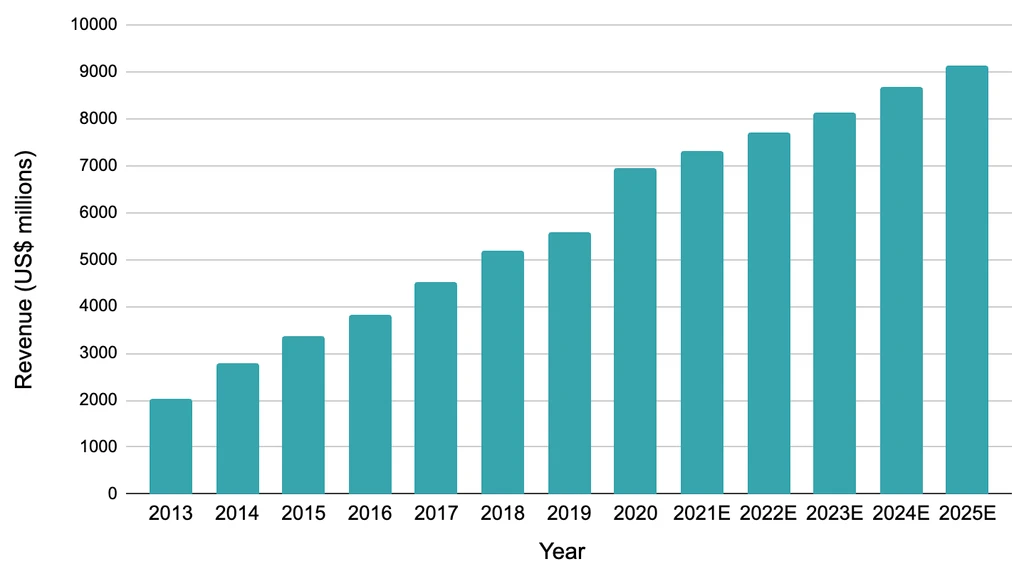Waterhouse VC: Sweepstakes mania

Sweepstakes casinos operate without real-money bets. Instead, they utilise a “freemium” approach. The model usually involves virtual tokens obtained at no cost or through indirect purchase, which then serve as play money for accessing in-game features. Virtual currency can be exchanged for cash or prizes following gameplay. The largest sweepstakes casinos have been operating for over 10 years.
In jurisdictions where real money online casino gaming – igaming – is illegal or not regulated, sweepstakes models effectively give players an experience that closely resembles igaming. Real money casino players would recognise the leading sweepstake casino products, with sweepstakes slot titles produced by companies such as Pragmatic Play, Playtech and NetEnt.
The global sweepstakes market saw revenue grow at 89% per annum between 2019 and 2022, reaching $3.1bn in 2022, according to Eilers & Krejcik Gaming. This is just under half of the US sports betting market, which recorded $7.5bn of gross gaming revenue in 2022. As expected, this was led by Flutter and DraftKings.
The US has driven the growth of the global sweepstakes market, with igaming still banned in most US states. Although online sports betting is now permitted in over 30 states, the legalisation of igaming has progressed much more gradually. Igaming is legal in just seven states: Connecticut, Delaware, Michigan, New Jersey, Pennsylvania, Rhode Island and West Virginia. In states without igaming, sweepstakes fills a wagering product gap by offering a similar igaming player experience.
Perth’s (real) gold rush
Virtual Gaming Worlds (VGW) is the dominant sweepstakes operator. It has more than 90% market share – according to Eilers & Krejcik Gaming – mostly through its Chumba Casino brand.
VGW’s customers purchase virtual gold coins to play in Chumba Casino. These coins do not carry any value outside of Chumba Casino. However, players purchasing gold coins receive bonus “sweeps coins”, which also serve as game currency. These can be exchanged for cash in most regions of the US and Canada.

VGW was founded by Laurence Escalante in 2010 and now has more than 1,300 staff globally. Around 220 of these are in Perth, Australia.
At just 42 years old, Escalante has become one of Australia’s wealthiest people, with a fortune of around AU$3.9bn (Australian Financial Review) and a circa 70% ownership share of VGW. VGW’s H1 results – released in March – reported a 29% increase in revenue to AU$2.8bn and a 23% increase in net profit to AU$207m.
Escalante’s success means he joins 28-year-old Ed Craven on the rich list. Craven co-founded Melbourne-based crypto wagering operator, Stake.com, in 2017. In 2021, Stake recorded AU$1.8bn in revenue and generated a net profit of AU$550m (Australian Financial Review), fuelling Craven’s AU$3.1bn fortune.
As a teen, Escalante’s first job was at Hungry Jacks, earning $5.65 per hour. He then studied Actuarial Studies and Economics in Sydney, while working in retail at The Reject Shop. Today, Escalante’s Instagram account reveals a very different life, resembling most boys’ fantasies.

VGW operates in the US under a Maltese gaming licence. But changes to federal sweepstakes regulations or variations in state laws could disrupt VGW and other sweepstakes operators. Furthermore, as more states legalise igaming, customers are likely to be attracted to igaming operators rather than sweepstakes casinos.
Rapid growth
The rapid growth of sweepstakes casinos has attracted several new players to the market in recent years. This includes Stake.US, a sweepstakes adaptation of Ed Craven’s well-known crypto wagering site. The sweepstakes market is forecast to grow at 31% per annum over the next three years, driven by growth in US states that do not permit igaming (Eilers & Krejcik Gaming).
Aristocrat Leisure has also developed games that offer players an experience resembling igaming. Over the past few years, Lightning Link Casino, a slot machine simulator, has consistently been the most profitable mobile game in Australia (Sensor Tower).
Lighting Link is one of several free-to-play slot machine simulators available in Australia, a jurisdiction where igaming is not allowed. Unlike sweepstakes models, businesses like Lightning Link are categorised as “social casinos”.
The primary distinction between social casinos and sweepstakes lies in the ability to win cash prizes on sweepstakes. While social casinos offer free-play experiences solely for entertainment purposes – with the ability to buy additional in-game currency – sweepstakes casinos offer the opportunity to win real money rewards.
Globally, players spend around $1bn on in-game currency across Aristocrat’s collection of social casino games. In 2020, social casinos generated close to US$7bn of revenue globally (Australian Communications and Media Authority).


Waterhouse VC is a fund for wholesale investors, specialising in global publicly listed and private businesses related to wagering and gaming.
Since inception in August 2019, Waterhouse VC has achieved a gross total return of 3,067% (111% annualised), as at 31 March 2024, assuming the reinvestment of all distributions.
